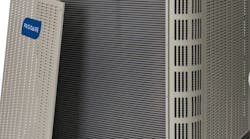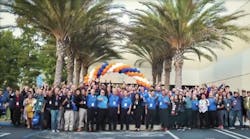Twenty-five years ago last month, three scientists published an article in Nature magazine alerting the world to the discovery of a hole in the Earth’s stratospheric ozone layer. This discovery triggered action by governments, industry, and environmentalists around the world and contributed to the Montreal Protocol agreeing to phase-out the production and consumption of chlorofluorocarbons (CFCs) and hydrochlorofluorocarbons (HCFCs) used as refrigerants in air conditioning and refrigeration systems.
Carrier Corp. pioneered the phase-out of CFCs for the air conditioning and refrigeration industry in 1994, two years ahead of U.S. requirements and 16 years before mandates in developing countries. Since then, Carrier has continued to develop cutting-edge sustainable products and solutions and has been recognized for its leadership in environmental stewardship. Carrier Corp., a world leader in heating, air-conditioning and refrigeration solutions, is a unit of United Technologies Corp.
“Life on Earth only began once the ozone layer was in place to shield harmful radiation from the sun,” explains John Mandyck, Carrier’s vice president for Sustainability & Environmental Strategies. “The discovery of ozone depletion and the rapid response by governments and industry around the world are widely credited with averting a global environmental and health crisis. We congratulate the Montreal Protocol for its great success.”
“Carrier is proud to have done its part in leading the air conditioning and refrigeration industry to a non-ozone depleting future,” adds Geraud Darnis, president of Carrier Corp.
The Montreal Protocol was signed in 1987 as a global environmental treaty to eliminate ozone depleting substances. The Protocol phased-out CFC production for developed countries in 1996 and developing countries starting in January of 2010. The Protocol also requires all HCFCs to be phased-out in new systems in 2020 for developed countries and 2030 for developing countries. Because CFCs are also strong global warming gasses, the Montreal Protocol is credited as a significant vehicle for slowing global warming emissions. According to a 2007 study published in the Proceedings of the National Academy of Sciences, the Montreal Protocol will have five to six times more benefit in reducing climate change than the current Kyoto Protocol.
Carrier continues its commitment to sustainability today with the development of next generation systems using refrigerants that further reduce environmental impact. “Carrier has the right refrigerant solution for every application, but every application will not have the same refrigerant solution,” says Mandyck. For example, Carrier’s CO2OLtecTM food retail refrigeration system uses natural refrigerant carbon dioxide and is installed at more than 100 sites across Europe. The system delivers up to 10 percent higher energy efficiency in cooler climates compared to conventional refrigerants. Carbon dioxide as a refrigerant is non-ozone depleting with minimal global warming potential. The cumulative global warming savings to date of the CO2OLtecTM systems installed by Carrier are equivalent to removing 10,800 cars from the road.
For its leadership in ozone protection and energy efficiency, Carrier has been the recipient of numerous local and national environmental awards. In 2007, Carrier received the U.S. Environmental Protection Agency's Best-of-the-Best Stratospheric Ozone Protection award in recognition of its achievements in helping restore the earth's ozone layer. In 2008, Carrier’s commercial refrigeration business in the United Kingdom was awarded the Environmental Pioneer in Cooling Award for its CO2OLtecTM system utilizing natural refrigerant. In 2009, for the third consecutive year, the Government of India's Ministry of Power awarded Carrier India First Prize for the National Energy Conservation Awards in the Consumer Goods Manufacturing Sector. Also in 2009, Carrier Korea was the recipient of the Korea Outstanding Green Energy Company Award in the environmental management category for the second consecutive year – the only air conditioning company to receive this award.
“At Carrier, we believe green products must start at a green company that demonstrates measurable results in four key areas: products, people, production and practices. We extend our influence across the value chain to reduce, and where possible eliminate, negative effects on our environment created by factories, products and suppliers,” says Mandyck.
For more than 20 years Carrier has led with sustainable solutions to advance energy efficiency and ozone protection, while minimizing the environmental impact of its manufacturing operations. From 1997 through 2006, Carrier doubled its revenues but held energy use flat. Starting in 2007, the company pledged to reduce its greenhouse gas footprint by 3 percent each year. In 2009, Carrier factories in Charlotte, N.C. and Huntington, Ind. became only the 10th and 11th in the world at that time to receive the U.S. Green Building Council’s LEED® green building rating for existing buildings. Extending its leadership to the global community, Carrier is the only company in the world to be a founding member of the U.S., China, and India Green Building Councils.
“Carrier will continue to serve as an environmental steward, finding both large and small ways to make the world a better place to live. The company is focused on delivering environmentally responsible energy efficient systems, services and solutions to the world,” Mandyck states.
For more information, visit www.carrier.com.





